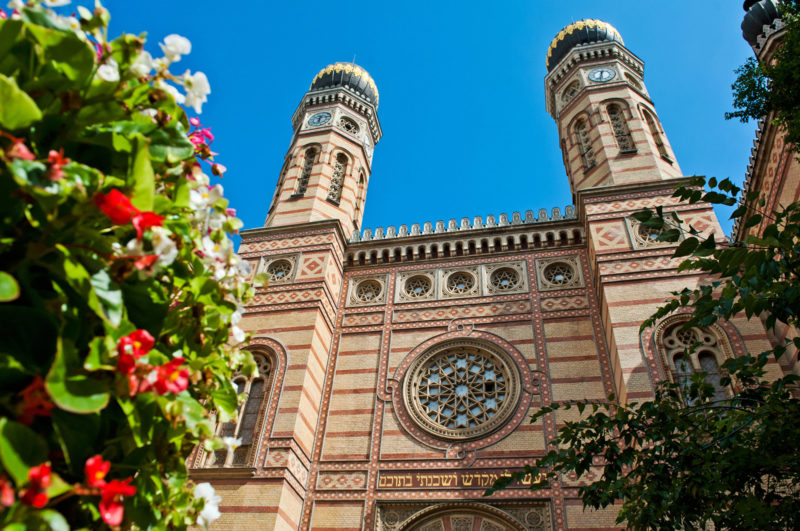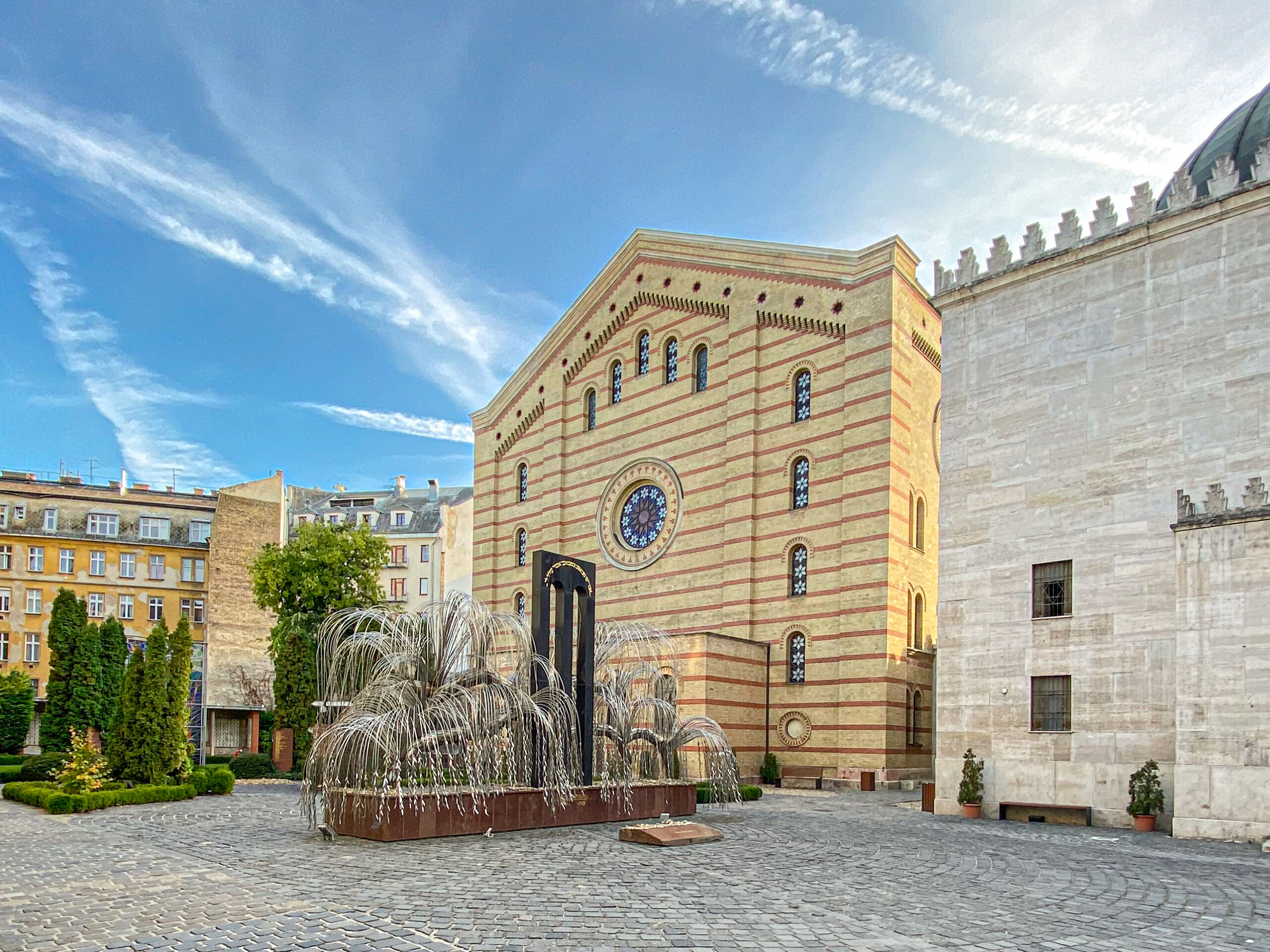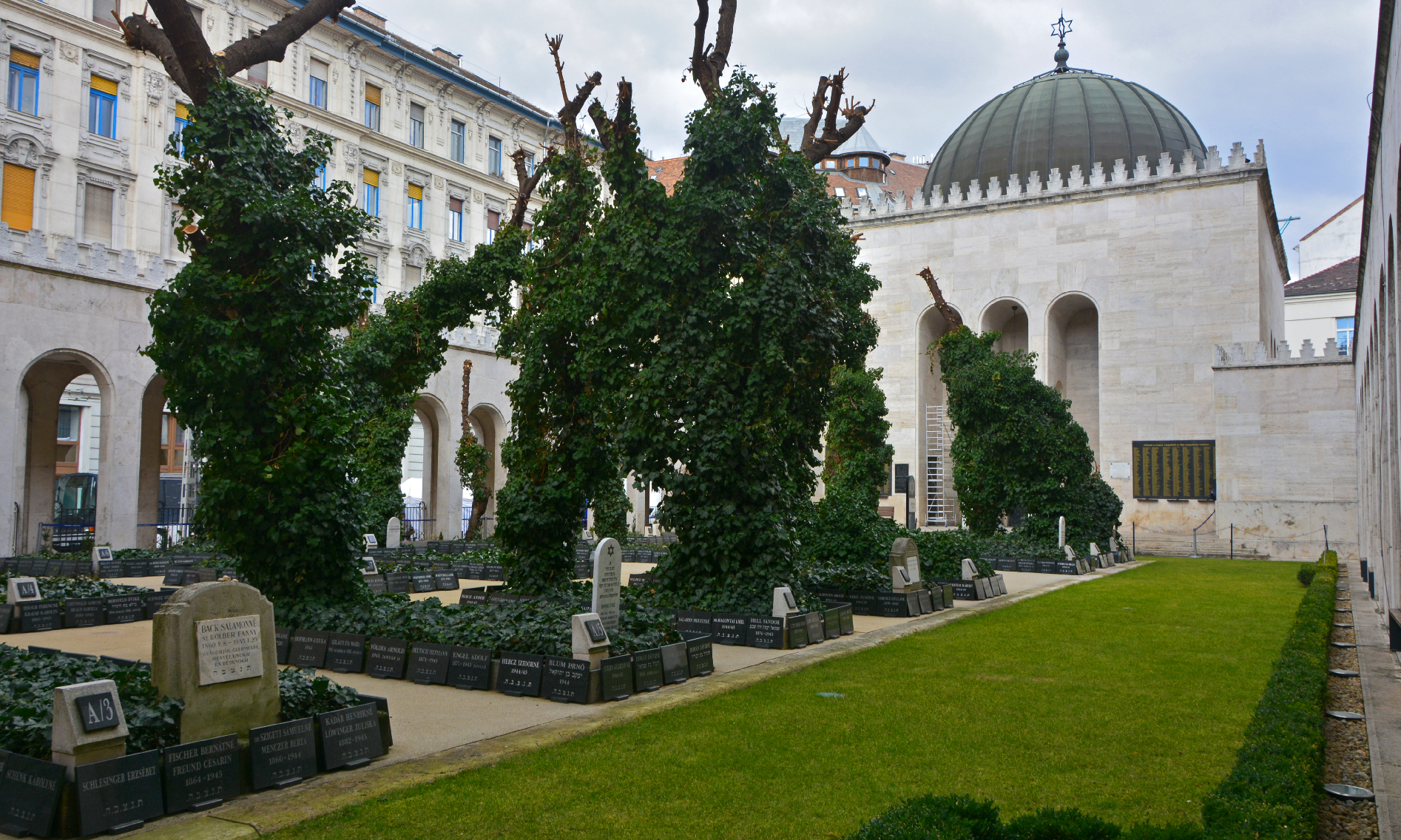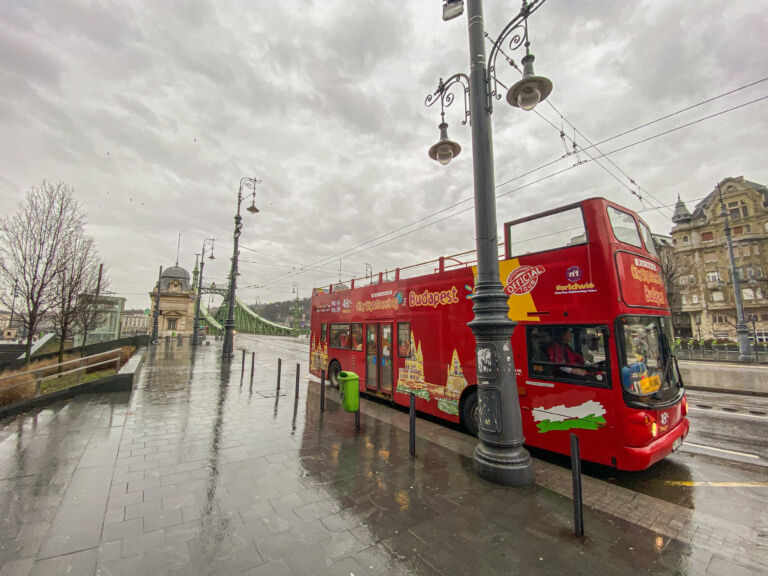Synagogues of Budapest – immerse yourself in the capital’s Jewish history

Synagogues of Budapest – immerse yourself in the capital’s Jewish history
There are many elements that have gone into making Budapest such a rich, colorful and interesting city. The Dohány Street Synagogue, the main synagogue of the city, and many other beautiful buildings from Jewish history are among the most important.
That vital element has been provided by the city’s Jewish community who have created a distinct sense of Jewish Budapest. There are many ways to enjoy this cultural and spiritual influence, but perhaps the most rewarding and authentic, is to visit some of the wonderful synagogues that are located in Budapest. Here we present the most well-known synagogues, and just some of the lesser-known, but all of them offer a taste and understanding of Budapest’s Jewish heritage. Here is a list about them:

Visit the Great Synagogue Budapest on Dohány Street
Of all the synagogues in Budapest, this is the one that is truly world-famous. Constructed between 1854 and 1859, it has endured a remarkable history ever since: attacked with explosives by pro-Nazis in 1939, and then, during WW2, it was taken over by German troops who used it as a radio communications center. It suffered damage from air raids and the Siege of Budapest. Following the war, the Dohány Street Synagogue (in Hungarian: Dohány utcai zsinagóga) was left in poor condition for decades, until in 1991 renovation began with international contributions. Prominently displayed, it is immediately recognizable with its onion-shaped black and gold domes and ochre-colored brickwork.
The synagogue is located on Dohány Street, right at the border of the Budapest Ghetto, which gives an additional layer of historic importance. Its courtyard of the synagogue includes a cemetery, unusual in Jewish tradition, but created as a result of the tragedies of the Holocaust.
Immersing in the history of the Great Synagogue, we learn that this marvelous establishment is not just a place of religion – it is also a Jewish museum. The main synagogue is the second largest synagogue in the world (after New York’s Temple Emanu-El) and remains a Jewish cultural treasure trove for all visitors. Within its confines, you’ll find the Hungarian Jewish Museum and its archives. The Raoul Wallenberg Holocaust Memorial Park, with its weeping willow sculpture carrying the names of victims, is also located here.

Another wonderful synagogue of Budapest: Rumbach Street Synagogue
This delightful synagogue was built in 1872 by the renowned Viennese architect Otto Wagner (the only building he ever constructed in Budapest). It showcases many of the exquisite traits associated with his designs but also hints at Wagner’s interest in Islamic architecture: a main feature of the synagogue is an octagonal, balconied dome. While it is not a copy of the Dome of the Rock shrine located in Jerusalem, Wagner clearly drew inspiration from it.
After decades of neglect, the Rumbach Synagogue was beautifully renovated and reopened in 2021. Today it serves as a cultural and religious space, hosting concerts, exhibitions, and community events.

Kazinczy Street Synagogue – another breathtaking establishment
Built in 1913, this Orthodox synagogue is not as prominently displayed as the Dohány Street and Rumbach Street synagogues, but it’s well worth a visit and easy to find in the Jewish Quarter. The intricate detail of the façade has been much admired since its construction, while the colorful, beautifully pieced-together Art Nouveau interior is a genuine delight. Designed by the Löffler brothers, it is one of the most ornate synagogues in Budapest.

Synagogues Outside of Budapest’s Jewish Quarter
Vasvári Pál Street Synagogue
Another gem hidden away close to the Jewish Quarter, this synagogue was completed in 1887. It has been important not only as a place of worship but also as an academic seat of learning. Managed today by the Chabad Lubavitch movement of Hungary, study and community activities continue to thrive here.
Jewish Synagogue of Újpest
Located in the northern district of Újpest, this synagogue is another well-preserved Jewish house of worship. A notable Holocaust memorial is present here, unveiled by the President of Hungary, bearing the names of around 17,000 local Jewish residents who perished in the Holocaust.
Synagogue of Kőbánya (The Church of Everyone)
Opened in 1911, this synagogue, built according to the design of Richárd Schöntheil, is no longer in use as a synagogue but has been repurposed. Today it serves other community and religious functions. The building is undeniably impressive from the outside, and much of its original design is still preserved, making it worth a visit.
Synagogue of Óbuda
Externally, the striking feature of this synagogue is apparent as soon as you see it: it is decidedly Classicist in style, though more precisely described as French Empire. Due to a 1712 ban on Jewish residents in Buda, many Jewish families settled in Óbuda. By 1821, the year of the synagogue’s completion, Óbuda had the largest Jewish community in Hungary. More recently, the building housed a television studio, but since 2010, it has once again been reestablished as a fully functioning synagogue.

Practical information
What are the movements of prayer?
When adopting the proper posture for prayer, it’s crucial to do so in the most natural way possible. Everyone must stand during certain parts of the service:
- When reciting the Baruch Sheamar, the Shemoneh Esrei
- From Vayevarech David until the prayer leader reaches the Borchu section
- When the Kedusha is said during the repetition of the Amidah
- When the Ark is open
- When the Torah is taken out of the Ark
Language of Prayers: Hebrew?
For those who do not understand Hebrew, it’s a valid question how to strive for devotion during prayers without knowing or understanding the words. The traditional language of Jewish prayer is Hebrew, but it’s not strictly necessary to pray in Hebrew. Halacha (Jewish law) stipulates that prayers can be recited in any language one understands. What’s important is that the congregation prays collectively in Hebrew.
What do you wear to the synagogue in Budapest? – Dress Code
Men cannot enter the synagogue without a head covering. Any hat or cap is suitable, but most visitors wear a kippah (yarmulke). Synagogues usually provide them at the entrance. Wearing a head covering, especially in a sacred place and while praying, is an ancient Jewish form of expressing reverence for God.
Women are expected to dress modestly. Married women traditionally cover their heads, though practices vary. Sleeveless tops, low-cut dresses, miniskirts, or overly revealing clothing are not considered appropriate. As a general rule, modest dress is always suitable.
Entrance fee: how much does it cost to go to the synagogue in Budapest?
- Adult ticket: 13,000 HUF
- Student ticket: 10,500 HUF
- Child ticket (6–12 years old): 5,500 HUF
- Family ticket (two adults, two children): 30,000 HUF
(Prices may vary slightly depending on season or tour packages.)
Opening hours: when is the Budapest synagogue open?
Closed every Saturday and on major Jewish holidays. Open on other days from 10 AM, with closing times varying seasonally between 4 PM and 6 PM. On Fridays, it closes earlier (around 2 PM). The ticket office closes one hour before closing time. Please check the opening hours on the official websites.

Final thoughts
Budapest’s Jewish community, one of the largest in Central Europe, has shaped the city’s cultural life for centuries and continues to thrive today. The Dohány Street Synagogue, the main synagogue of Budapest and the second largest synagogue in the world, stands as the most famous symbol of this heritage, combining striking Moorish architecture with a moving history. Its unique location at the border of the Budapest ghetto, together with the courtyard of the synagogue and Holocaust memorials, make it a deeply significant place to visit.
At the same time, other synagogues – from the ornate Kazinczy Street Synagogue to the historic Óbuda and the newly revived Rumbach – highlight the diversity and resilience of Jewish culture in the capital. Memorials at many of these sites remind visitors of the tragedies of the 20th century, while their present-day use shows the vitality of the community.
Visiting Budapest’s synagogues is more than sightseeing: it is a journey through history, culture, and faith. Together, they offer an unforgettable experience that connects past and present in the heart of the city.
FAQ
How Many Synagogues Are There in Budapest?
There are around 16 synagogues in Budapest today, some functioning actively for religious services, while others serve as cultural or community spaces.
Other delightful synagogues, definitely worth visiting:
Frankel Leó Street Synagogue (Budapest, Frankel Leó út 49.)
Hegedűs Gyula Street Synagogue (Budapest, Hegedűs Gyula u. 3.)
Which is the oldest operating Synagogue in Budapest?
Budapest’s oldest operating synagogue is the Óbuda Synagogue, originally dating back to the 1760s, and reconstructed in 1820 based on the plans of András Landherr. It features a classical façade with baroque elements inside.
Which is the most ornate Synagogue in Budapest?
Perhaps the most ornate synagogue in Budapest is the Kazinczy Street Orthodox Synagogue, built in 1913. The simple exterior reveals nothing of the richly decorated, Art Nouveau interior, complete with painted walls and ceilings. Designed by Sándor and Béla Löffler, it is part of the Orthodox Jewish community’s complex, including other communal and religious spaces.
Are there tours of the Budapest Synagogue?
Yes, guided tours are available in multiple languages, included in the ticket price. They cover the synagogue, the museum, the cemetery, and the Holocaust memorial. In addition, larger Jewish Quarter walking tours include multiple synagogues and last several hours.
Is there a Jewish Museum associated with the Great Synagogue?
Yes, there is a Jewish Museum located adjacent to the Great Synagogue. It houses an extensive collection of Jewish artifacts and provides insights into the rich history of Jews in Hungary, making it a valuable addition to your visit to the synagogue.
Can I buy my ticket online for the Great Synagogue in Budapest?
Yes, you can buy your ticket online for the Great Synagogue in Budapest. Purchasing tickets in advance is recommended to avoid long queues and to ensure entry during busy tourist seasons.
If you would liket to read about the synagogues in Budapest, check our articles below:





